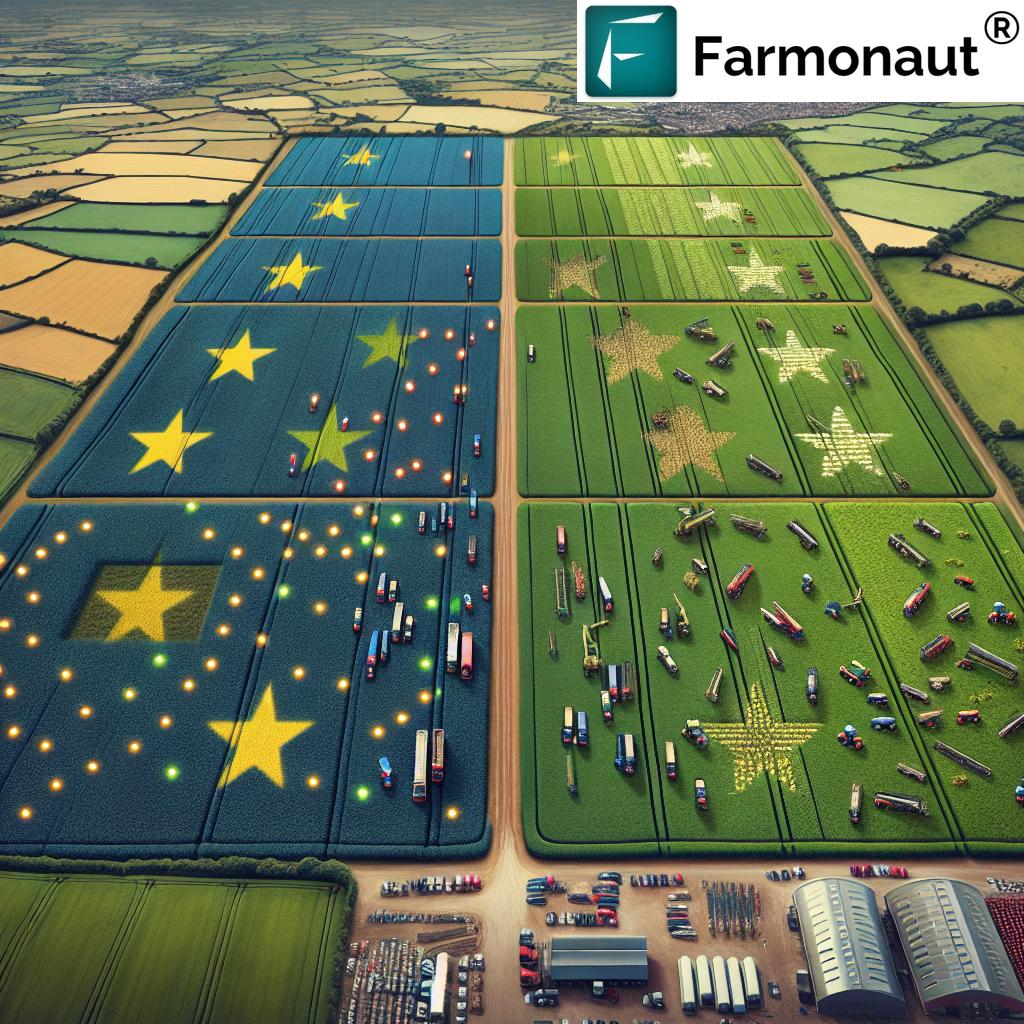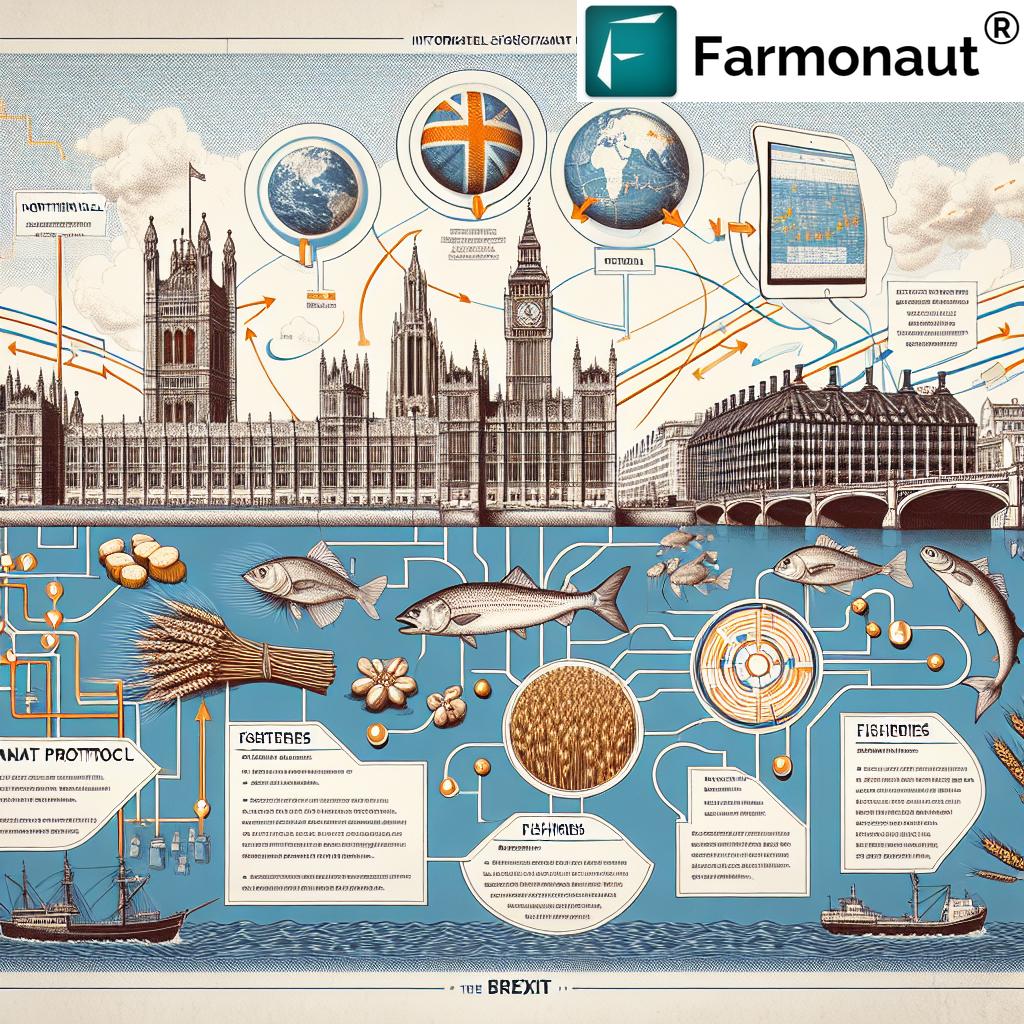Brexit’s Impact on UK Agriculture: Navigating EU-UK Trade Negotiations and the Future of British Farming

“Brexit negotiations impact over 280,000 UK farms, collectively managing 17.4 million hectares of agricultural land.”
As we delve into the complex world of EU-UK trade negotiations and their profound impact on British agriculture, it’s crucial to understand the far-reaching consequences of Brexit on the UK farming sector. The transition period has ended, and farmers across the nation face unprecedented uncertainty regarding future EU-UK cooperation and governance structures. In this comprehensive analysis, we at Farmonaut will explore the intricacies of these negotiations, the progress on key issues, and the potential outcomes that could reshape Britain’s farming policies and impact the broader European agricultural market.
The Changing Landscape of UK Agriculture Post-Brexit
Brexit has ushered in a new era for UK agriculture, fundamentally altering the relationship between British farmers and the European Union. The withdrawal from the EU’s Common Agricultural Policy (CAP) has necessitated the creation of new domestic agricultural policies, presenting both challenges and opportunities for the UK farming community.
- Transition from EU subsidies to UK-specific support schemes
- Reshaping of trade relationships with EU member states
- Development of new environmental and regulatory frameworks
- Addressing labor shortages in the agricultural sector
As negotiations between London and Brussels continue, the focus remains on establishing a level playing field that ensures fair competition while respecting the UK’s sovereignty. The talks have been particularly intense around fisheries agreements, which have significant implications for coastal communities and the wider food industry.
EU-UK Trade Negotiations: Key Issues and Progress
The ongoing EU-UK trade negotiations have been marked by complex discussions on various fronts, with agriculture at the forefront of many debates. Let’s examine some of the critical areas under negotiation:
1. Level Playing Field Provisions
The concept of a ‘level playing field’ has been a cornerstone of EU-UK negotiations. It aims to ensure fair competition between UK and EU businesses by maintaining similar standards in areas such as:
- State aid
- Competition law
- Environmental protections
- Labor rights
For the agricultural sector, this means navigating a delicate balance between maintaining access to EU markets and having the flexibility to set UK-specific regulations.
2. Fisheries Agreement
The fisheries agreement has been one of the most contentious issues in the Brexit negotiations. The UK’s desire to take back control of its waters clashes with the EU’s aim to maintain access for its fishing fleets. This has significant implications for:
- Coastal communities reliant on fishing
- The wider seafood industry and supply chains
- International relations with EU member states
Progress in this area has been slow, with both sides struggling to find a compromise that satisfies their respective interests.
3. Northern Ireland Protocol
The Northern Ireland Protocol, designed to prevent a hard border on the island of Ireland, has far-reaching implications for the agri-food industry. It effectively keeps Northern Ireland in the EU’s single market for goods, creating unique challenges and opportunities:
- Potential for regulatory divergence between Northern Ireland and the rest of the UK
- Complexities in moving goods between Great Britain and Northern Ireland
- Opportunities for Northern Irish farmers to access both UK and EU markets
The implementation of the protocol remains a source of ongoing discussions and adjustments.
Discover how Farmonaut’s satellite-based farm management solutions can help navigate these changes
The Internal Market Bill and Its Implications
The UK Internal Market Bill, introduced in September 2020, has significant implications for the agricultural landscape. This legislation aims to ensure seamless trade between the four nations of the UK post-Brexit. However, it has raised concerns about:
- Potential conflicts with the Northern Ireland Protocol
- The balance of power between Westminster and devolved administrations
- Maintaining food and environmental standards across the UK
The bill’s provisions could reshape the way agricultural goods move within the UK, potentially impacting farmers’ access to different regional markets.
Future EU-UK Cooperation and Governance Structures
As the UK charts its course outside the EU, new structures for cooperation and governance in agriculture are being developed. These include:
- Joint committees for ongoing dialogue on agricultural issues
- Mechanisms for resolving trade disputes
- Frameworks for sharing research and best practices
The nature of these structures will play a crucial role in shaping the future relationship between UK and EU agriculture.
“The UK-EU trade in agri-food products was worth approximately £47 billion in 2019, highlighting Brexit’s significant economic impact.”
Potential Outcomes and Their Impact on UK Farming
The outcomes of the EU-UK negotiations will have far-reaching consequences for British farmers. Possible scenarios include:
- Comprehensive Free Trade Agreement: This could maintain tariff-free access to EU markets, but likely with some regulatory alignment.
- Limited Trade Deal: Might introduce tariffs on some agricultural goods, potentially affecting competitiveness.
- No-Deal Scenario: Could lead to significant disruptions in trade and potentially higher costs for farmers.
Each of these outcomes would necessitate different adaptations from the UK farming community, from changes in production methods to exploring new export markets.
Explore Farmonaut’s API for advanced agricultural data analysis
Reshaping National and International Trade Dynamics
Brexit is not just reshaping UK-EU relations; it’s also altering the UK’s position in global agricultural trade. This transformation involves:
- Negotiating new trade deals with non-EU countries
- Adapting to World Trade Organization (WTO) rules
- Balancing domestic production with international competitiveness
These changes present both opportunities and challenges for UK farmers, who must navigate new markets while maintaining competitiveness.
The Role of Technology in Adapting to Post-Brexit Agriculture
As the UK agricultural sector adapts to the post-Brexit landscape, technology will play a crucial role in enhancing productivity and competitiveness. At Farmonaut, we recognize the importance of innovative solutions in this transitional period. Our satellite-based farm management tools can help farmers:
- Optimize crop yields through precise monitoring
- Reduce resource wastage with data-driven insights
- Improve traceability to meet new regulatory requirements
- Enhance overall farm efficiency to remain competitive in changing markets
By leveraging advanced technologies, UK farmers can better position themselves to thrive in the new agricultural paradigm.
Access Farmonaut’s API Developer Docs for integration into your farming systems

Environmental Considerations in Post-Brexit Agricultural Policy
The UK’s exit from the EU presents an opportunity to reshape environmental policies in agriculture. The government has signaled a shift towards a “public money for public goods” approach, which could see farmers rewarded for:
- Enhancing biodiversity
- Improving soil health
- Reducing carbon emissions
- Implementing sustainable farming practices
This new direction aligns with global trends towards more sustainable agriculture and could position UK farmers as leaders in environmentally friendly farming practices.
Labor and Workforce Challenges
One of the most immediate challenges facing UK agriculture post-Brexit is the potential shortage of seasonal workers. The end of free movement has significant implications for farms that rely heavily on EU labor. To address this issue, the UK government has introduced:
- Seasonal Worker Pilot Scheme
- Points-based immigration system
- Initiatives to attract domestic workers to agriculture
However, concerns remain about whether these measures will be sufficient to meet the sector’s labor needs, particularly during peak harvest seasons.
The Future of Agricultural Subsidies
The transition away from the EU’s Common Agricultural Policy (CAP) marks a significant shift in how UK farmers receive financial support. The new system, which will be phased in over several years, aims to:
- Reward farmers for environmental stewardship
- Encourage productivity and innovation
- Support rural communities
This change represents both a challenge and an opportunity for farmers to adapt their business models and explore new revenue streams.
Impact on Food Standards and Safety
Maintaining high food standards has been a key point of discussion in Brexit negotiations. The UK has committed to upholding its current standards, but debates continue around:
- Potential divergence from EU regulations
- Implications of trade deals with non-EU countries
- Balancing consumer protection with market access
These discussions have significant implications for both farmers and consumers, as well as for the UK’s reputation as a producer of high-quality food products.
Comparative Analysis: UK Agriculture Pre and Post-Brexit
| Agricultural Aspect | Pre-Brexit Status | Post-Brexit Outlook |
|---|---|---|
| EU Subsidies | Received under Common Agricultural Policy | Transition to UK-specific support schemes |
| Trade Tariffs | Tariff-free access to EU market | Potential introduction of tariffs depending on trade deal |
| Labor Availability | Free movement of EU workers | Restricted access, new visa schemes for seasonal workers |
| Environmental Regulations | Aligned with EU standards | Potential for UK-specific regulations, focus on ‘public goods’ |
| Fisheries Access | Shared access to EU waters | Negotiated access, potential for increased UK control |
| Northern Ireland Protocol Impact | N/A | Special status for NI, potential regulatory divergence from rest of UK |
| Internal Market Regulations | EU single market rules | New UK Internal Market Bill, potential for inter-UK trade frictions |
The Road Ahead: Adapting to the New Agricultural Landscape
As the UK continues to navigate the post-Brexit landscape, the agricultural sector faces a period of significant transformation. Farmers, policymakers, and stakeholders across the industry must work together to:
- Develop robust domestic agricultural policies
- Explore new markets and trade opportunities
- Invest in innovation and technology to enhance productivity
- Address environmental challenges and promote sustainability
- Ensure food security and maintain high standards
The coming years will be crucial in shaping the future of British farming, and adaptability will be key to success in this new era.
Conclusion: Embracing Change and Opportunity
The impact of Brexit on UK agriculture is profound and far-reaching. While challenges abound, there are also significant opportunities for innovation, growth, and sustainability. As we continue to monitor the ongoing negotiations and policy developments, it’s clear that the future of British farming will be shaped by how well the sector adapts to these changes.
At Farmonaut, we remain committed to supporting farmers through this transition with our advanced satellite-based farm management solutions. By leveraging technology and data-driven insights, we believe UK agriculture can emerge stronger and more resilient in the post-Brexit era.
As negotiations progress and new policies are implemented, we’ll continue to provide updates and analysis on how these changes affect the agricultural landscape. Stay tuned to our blog for the latest developments and insights into the future of UK farming.
Frequently Asked Questions
- How will Brexit affect EU subsidies for UK farmers?
Brexit means UK farmers will no longer receive subsidies under the EU’s Common Agricultural Policy. The UK government is transitioning to a new system of farm support, focusing on environmental stewardship and productivity. - What changes can UK farmers expect in trade relationships with the EU?
The nature of trade relationships will depend on the final agreement between the UK and EU. Farmers may face new tariffs, quotas, or regulatory checks when exporting to the EU, depending on the terms of the deal. - How will the Northern Ireland Protocol impact agriculture in Northern Ireland?
The Northern Ireland Protocol keeps Northern Ireland aligned with EU single market rules for goods, including agri-food products. This creates a unique situation where NI farmers might have different regulations compared to the rest of the UK but potentially easier access to EU markets. - Will there be changes to food standards and safety regulations post-Brexit?
The UK government has committed to maintaining high food standards. However, there may be divergence from EU regulations over time, and new trade deals could impact food standards and safety regulations. - How can UK farmers prepare for potential labor shortages?
Farmers can explore the new Seasonal Worker Pilot Scheme, invest in automation and technology, and develop strategies to attract and retain domestic workers to address potential labor shortages.






